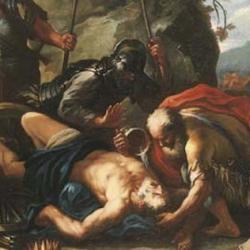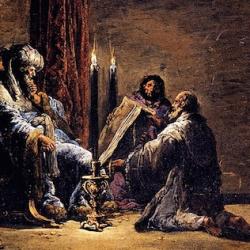The Chronicler gathers all Israel – indeed, a cross section of ancient humanity – on the opening pages of his chronicle. The genealogy is a great, inter-generational qahal (assembly), and the Chronicler is the Qoheleth, the Gatherer.
As soon as his story starts, though, Israel is being dispersed. Israel flees before the Philistines at the battle of Mount Gilboa (1 Chronicles 10:1) and when they see that Saul and his sons are dead they abandon their cities (10:7). Because of Saul’s transgression, they are scattered like sheep without a shepherd.
That sets us up for a persistent pattern in Chronicles: Good kings gather, unfaithful kings scatter. Good kings preside over all-Israel qahals; bad kings are never portrayed at the head of an assembly.
Many of the uses of the noun qahal in 1-2 Chronicles occur in the reigns of David (1 Chronicles 13:2, 4; 28:8; 29:1, 10, 20 [2x]) and Solomon (7x; 2 Chronicles 1:3, 5, 6:3 [2x], 12, 13; 7:8). Jehoshaphat assembles the people to meet an invasion (2 Chronicles 20:5, 14). Jehoiada leads the qahal in covenant renewal (2 Chronicles 23:3; 24:6), and during Hezekiah’s restoration and Passover the noun is used 14x (2 Chronicles 29:23, 28, 31; 29:32; 30:2, 4, 13, 17, 23, 24 [2x], 25 [2x]; 31:18).
The verb “assemble” is used only 7x in the whole of 1-2 Chronicles, and the distribution overlaps that of the noun: David (1 Chronicles 13:15; 15:3; 28:1); Solomon (2 Chronicles 5:2, 3). The surprise is that Rehoboam assembles Judah for war (2 Chronicles 1:1).
All Israel assembles to make David and Solomon king, to offer sacrifice, to feast in Yahweh’s presence, to renew covenant, to bring His ark-throne into Jerusalem and to dedicate a permanent house for the throne, to engage in liturgical warfare against invaders, to sing and play music, to eat, drink, and rejoice before the Lord. The assembly is the way the world ought to be, a condensed portrait of what Israel-bef0re-Yahweh is called to be.
2 Chronicles 28:14’s of the noun is anomalous. The Chronicler is recounting an event during the reign of Ahaz. Israel, the northern kingdom, has soundly defeated the south. It’s the worst defeat Judah ever suffers at the hands of Israel. It’s a small-scale exile: Israel takes men, women, and children of Judah as slaves and grabs plunder.
A prophet, Oded, intervenes to rebuke Israel for their mistreatment of Judah. The army of Israel leaves the spoil and captives in Samaria, and equips them to return home. Verse 14 states: “the armed men left the captives and the spoil before the officers and all the assembly (qahal).”
In context, the qahal must be the assembly of the people of Israel who are gathered at Samaria. It’s the only time that the northern kingdom is dignified as an assembly. The Chronicler uses the word because here, for once, Israel acts as an assembly, as a qahal of Yahweh: They listen to the word of the prophet and thereby honor Yahweh as King; they treat the southern kingdom as brothers who may not be enslaved; they confess their guilt and the Lord’s burning anger against them; they show mercy and generously distribute the spoils to the captives.
And this when Judah is devoting itself to Ahaz’s idols and when Ahaz is dismantling the temple. Israel proves to be more the qahal of Yahweh than Judah.
















